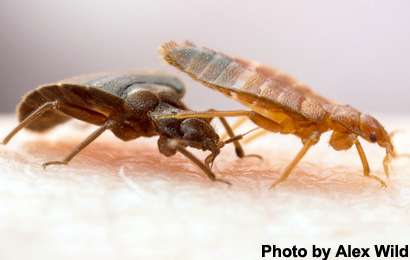Researchers compare efficacy of 'natural' bed bug pesticides

Concerns over human-insecticide exposure has stimulated the development of alternative bed bug control materials, and many essential oil-based pesticides and detergent insecticides have been developed in recent years. But how well do they work? To find out, researchers from Rutgers University evaluated the efficacy of nine essential oil-based products and two detergents that are labeled and marketed for bed bug control. The results are published in an article in the Journal of Economic Entomology.
The non-synthetic bed bug pesticides—which contain ingredients such as geraniol, rosemary oil, mint oil, cinnamon oil, peppermint oil, eugenol, clove oil, lemongrass oil, sodium lauryl sulfate, 2-Phenethyl propionate, potassium sorbate, and sodium chloride—included the following products:
- Bed Bug 911
- Bed Bug Bully
- Bed Bug Fix
- Bed Bug Patrol
- Ecoexempt IC2
- EcoRaider
- Eradicator
- Essentria
- Rest Assured
- Green Rest Easy
- Stop Bugging Me
When the researchers sprayed the 11 non-synthetic pesticides directly on bed bug nymphs, they found that only two—EcoRaider (1% geraniol, 1% cedar extract, and 2% sodium lauryl sulfate) and Bed Bug Patrol (0.003% clove oil, 1% peppermint oil, and 1.3% sodium lauryl sulfate)—killed more than 90 percent of them. None of the non-synthetic insecticides had any noticeable effect against bed bug eggs except for EcoRaider, which killed 87 percent of them.
While these lab results may seem promising, the effectiveness of both products is probably much lower in actual settings because it is extremely difficult to spray any product directly on bed bugs because of their ability to hide in tiny cracks and crevices.
"Under field conditions, bed bugs hide in cracks, crevices, creases, and many other places where insecticide application may not be directly applied onto the hidden insects," the authors wrote. "Additional studies under field conditions are warranted to determine the field efficacy of EcoRaider and Bed Bug Patrol and how they can be incorporated into a bed bug management program."
Curiously, some of the active ingredients in EcoRaider and Bed Bug Patrol are also found in some of the other tested products that exhibited very low rates of efficacy, an indication that the products' inactive ingredients are also important.
"Other factors besides the active ingredients must have accounted for the high efficacy of some essential oil-based pesticides," the authors wrote. "Adjuvants such as wetting agents, spreaders, stabilizers, defoamers, stickers, and solvents may produce synergistic effects to essential oils by improving penetration through insect cuticle and translocation of the active ingredients within insect body."
More information: The full article, "Potential of Essential Oil-Based Pesticides and Detergents for Bed Bug Control," is available at esa.publisher.ingentaconnect.c … ints/content-EC14328
Journal information: Journal of Economic Entomology
Provided by Entomological Society of America



















